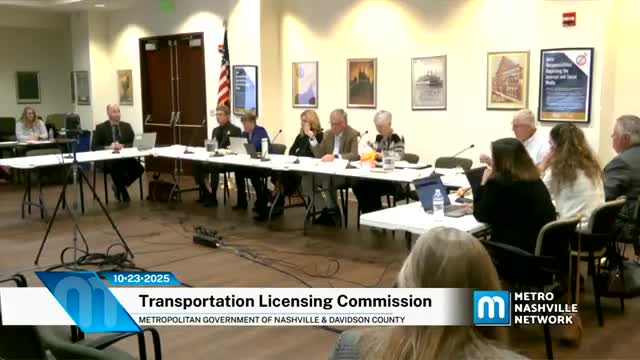Council approved seated sightseeing vehicle ordinance; MTLC to draft rules, interview current certificate holders
Get AI-powered insights, summaries, and transcripts
Subscribe
Summary
Council passed a new ordinance creating a separate seated sightseeing vehicle category. MTLC staff will draft new rules, preserve existing certificate rights, and bring proposed regulations back to the Commission in November for consideration.
Metro Council has approved an ordinance that creates a distinct classification for seated sightseeing vehicles and establishes a new Metro Code chapter for the category, Transportation Licensing Commission staff told the Commission.
The mayor signed the ordinance on Oct. 10, staff said, and the Commission must now develop a new set of rules and procedures to implement the change. Staff told commissioners they will repeal sightseeing-specific rules currently nested under the ETV (entertainment-transportation vehicle) section, create a new seated-sightseeing rules package, and prepare application forms for companies, drivers and a new 4-to-6 p.m. permit referenced in the ordinance.
Why it matters: The new category separates sightseeing operations from entertainment and tour-type ETV rules and raises immediate questions about how existing sightseeing certificate holders and outside-core permits (the so-called 4-to-6 p.m. permits) will be handled. Several operators and a public commenter expressed concern that the ordinance and rulemaking could alter current operating rights.
What staff told the Commission - The ordinance passed Council; the mayor signed it Oct. 10. The ordinance creates Metro code chapter 6.78 for seated sightseeing vehicles. - Staff (TD) and policy teams are drafting rules and expect to present draft rules at the Commission's November meeting. The new rules will include processes to interview current certificate holders because staff said the Commission cannot unilaterally take existing certificates away. - The ordinance includes a permit that allows sightseeings to operate from 4 to 6 p.m. outside the core; staff said they are drafting application and evaluation procedures for that permit.
Public comment and operator concerns A public commenter, Michael Winters, said operators currently hold "sightseeing permits that allow me to operate from 4 to 6 outside of the core" and worried that the new permits and rules might remove those existing operating rights. "If I take these new permits, and move over to the new permits, if my 4 to 6 operations as I currently run is taken away, then I will not surrender my permits under state law," Winters told the Commission.
Winters also raised concerns that requiring traffic studies for operations in the downtown core would disadvantage small operators who cannot absorb high study costs and that vehicle-stand rules could unfairly favor larger operators that use 40-foot vehicles. Staff acknowledged those issues and said they are part of rulemaking work.
Next steps: Staff aims to bring draft rules, application forms, and an implementation timeline to the Commission by the November meeting; staff also flagged several date-driven items in the ordinance that require action within prescribed timeframes.
Ending: The Commission set the policy work as a priority for the coming meeting cycle and asked staff to return with draft rules and procedures in November for consideration.
